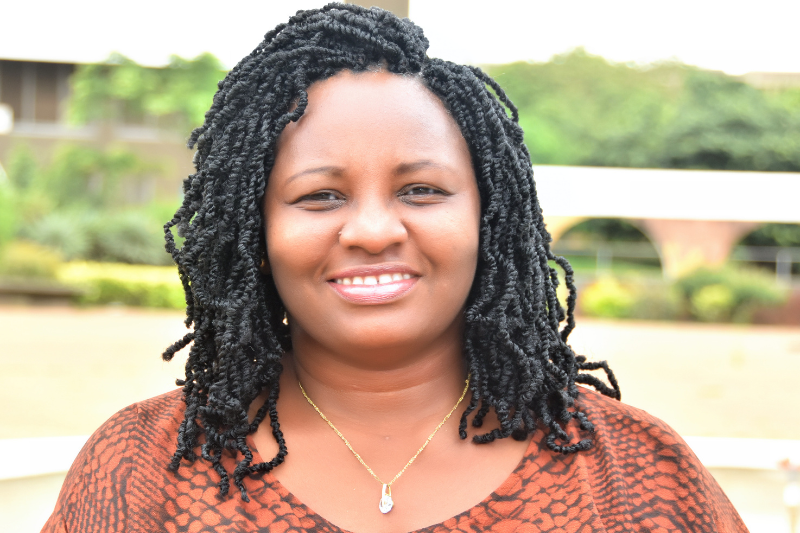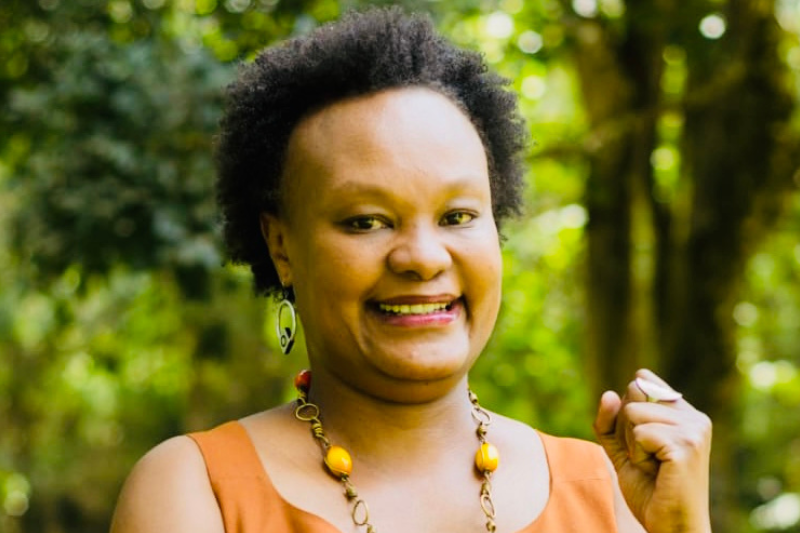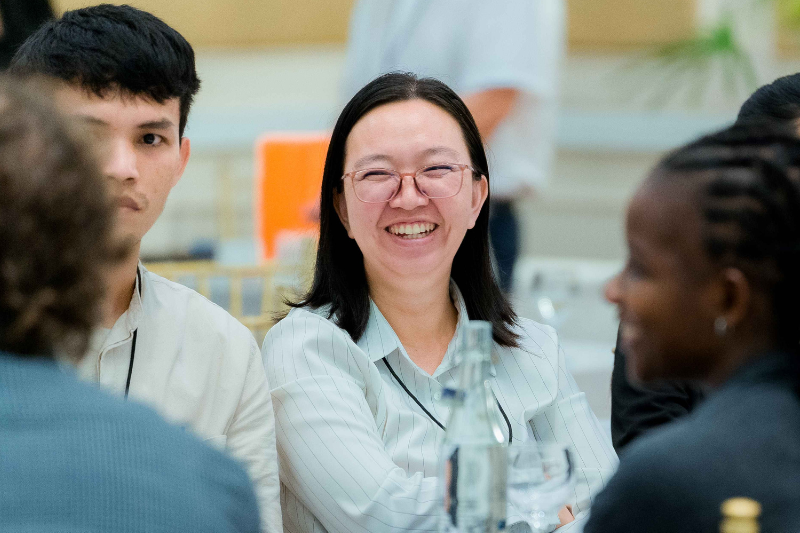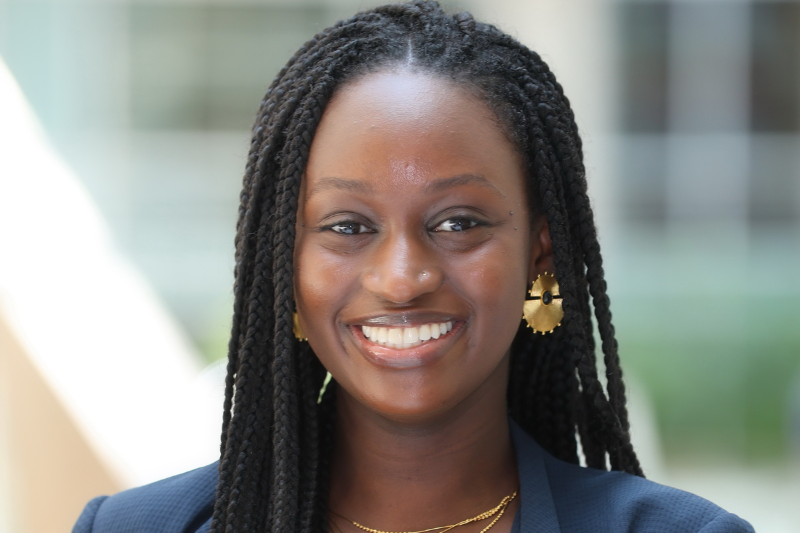Posted on June 24th, 2024 in Research Profile
Growing up as a young girl in Lagos, Nigeria, Nkem Torimiro had a dream of becoming a doctor to save lives. But she hit a bump in the road after high school, when the University of Port-Harcourt offered her admission to study botany instead of medicine. She accepted the offer, but with her heart still set on a career in human health.
“It was during my final year while working on a project on isolating bacteria from a diseased plant that I got fascinated by the world of microorganisms,” says Torimiro. “Subsequently, I furthered my graduate studies in microbiology, and it has been a worthwhile experience ever since.”
Continue reading on Agrilinks
Posted on January 30th, 2024 in Research Profile
As the oldest of four children, Catherine Nkirote Kunyanga felt driven at a young age to excel in school as a way to pull her family out of poverty. Based in Nairobi, Kenya, her father worked in the private sector for years but then lost his job, while her mother stayed home. After primary school, Kunyanga moved to rural Meru County to attend high school, where she ranked top of the class for every subject and was the first female student to ever earn grade A in the school.
“Our parents were very keen on us going to school, and being a firstborn, I knew that education was the only way I could help my family,” she said. Kunyanga returned to the capital after being accepted to the prestigious University of Nairobi, where she completed her bachelor’s, master’s and Ph.D. degrees in food science and technology.
Continue reading on Agrilinks
Posted on January 3rd, 2024 in Research Profile
Upon returning to Cambodia in 2016 after four years abroad, Navin Sreng found herself at an unexpected crossroads in her scientific career. She had a newly minted Ph.D. in biology in hand from France’s prestigious Paul Sabatier University, where she attended on full scholarship, and had her sights set on a faculty position back home.
“The scholarship had a requirement that when I finish my studies, I come back to help my home country,” says Sreng, who grew up in Phnom Penh to a middle-class family. “And when I was in France, I was close to a Cambodian lecturer who advised me that I should work for a university.”
Continue reading on Agrilinks
Posted on November 8th, 2023 in Research Profile
By Valeria Mendoza
Meet Diamilatou Kane, a second-year Purdue University Ph.D. student in agricultural economics whose interests lie at the intersection of economics, food safety, and food security in developing countries. Born and raised in Senegal, Diamilatou earned a Bachelor of Arts in Economics from Mount Holyoke College, worked at the World Bank as a Junior Professional Associate, completed a Master of Science in Development Economics at the University of Göttingen, and interned at IPAR, a think tank in Senegal. With support from the Feed the Future Innovation Lab for Food Safety, Diamilatou has started a research project to understand Senegalese urban consumers’ preferences for different types of milk. We talked with Diamilatou to learn more about food safety risks in Senegalese dairies, her vision for creating change, and why she chose Purdue for graduate study in agricultural economics.
As an agricultural economist, what food safety research will you be doing in Senegal?
Consumers are often distanced from the processes involved in producing the food they purchase. This is particularly the case for dairy products, where delicate steps are needed because of the perishability of milk. In the context of underdeveloped countries like Senegal, where cold chain infrastructures are lacking and informal markets dominate, I have observed that the urban dairy market was flooded with traditionally processed milk products by local vendors, often lacking in safety standards. Also, given that Senegal relies heavily on imports for over half of its milk consumption, it became imperative for me to understand how Senegalese consumers perceive and value the milk they consume. My work will include assessing consumers’ willingness to pay a premium price for milk products produced with safer practices, and also their willingness to pay a premium for local milk as opposed to imported milk. My goal is to determine how urban dairy consumers value milk safety and perceive milk products made from locally-sourced milk versus imported milk powder.
From your experience with the World Bank and development-related research, what do you see as the biggest challenges for traditional food systems in Africa?
A major challenge with agriculture in rural Africa, and rural Senegal in particular, is that it’s still lacking in technological development. Obviously, that impacts productivity, yields, and livelihoods. Part of the reason is that there are so many smallholder farmers, and more than 60% of the population in Africa works in agriculture. People have tried to implement Green Revolution approaches in Africa, but it hasn’t worked. They have tried to invest in research and development, but it hasn’t worked either. This is perhaps due in part to farmers not being willing and able to adopt those technologies, but there is also not enough synergy among policy-makers, researchers, and the scientific world. I would say in Africa, the biggest problem is developing that synergy to make good policies that would positively impact the agricultural sector.
Why did you choose to study at Purdue?
My passion for development was fueled by my previous field experiences in developing countries. I chose to specialize in agricultural economics because, in sub-Saharan Africa, as previously mentioned, more than 60% of the population are smallholder farmers, and agriculture contributes about 35% to Africa’s GDP, which is substantial. Purdue’s top-five ranking in agricultural economics and the chance to work with my now advisor, Dr. Jacob Ricker-Gilbert, a respected figure in the field, made it my clear choice. Another pivotal moment in my decision-making was a meeting with Dr. Akinwumi Adesina, President of the African Development Bank, during my time at the World Bank. He, being both an agricultural economist and a Purdue graduate, encouraged me to apply to Purdue. His encouragement solidified Purdue as a top choice for Ph.D. programs. Now, I’m excited to conduct research in Senegal as part of my academic journey.
What is unique about Purdue’s graduate program in agricultural economics?
In many U.S. Ph.D. programs, it’s customary to complete two years of coursework before immersing oneself in the dissertation phase. However, Purdue’s Department of Agricultural Economics distinguishes itself by actively promoting a continuous engagement with research. This includes activities such as submitting grant applications, presenting preliminary findings at conferences, and crafting research proposals. For my case specifically, I was already able to conduct fieldwork as background research as soon as the end of my first year, laying the groundwork for the consumer study I plan to conduct in December 2023, which will also serve as the first essay of my dissertation. At Purdue, I’ve found a good balance between being supported and being challenged as a researcher. I already feel like I’m ahead in my program.
How do you hope to make an impact through your research and career?
I know that I want to move back home to contribute to the development of my country. I think one of the most significant issues in Senegal, and why I think development projects conducted by decision-makers are not working very well, is that there’s just not enough data and relevant information, which can lead to poor research investments and unsuccessful policies. To bridge the data gap, we need to conduct impact evaluations of projects to understand what has been done and what should not be repeated. I think one important thing in research, in general, is not just thinking about it in terms of the problem and finding the solution. You have to come up with research that you think that decision-makers are going to be interested in. That’s why I’ll be looking for a job that allows me to work with decision-makers and develop policies that can be effectively implemented in the real world.
Valeria Mendoza is a program assistant with the Feed the Future Innovation Lab for Food Safety and is pursuing a degree in Food Science at Purdue University.





